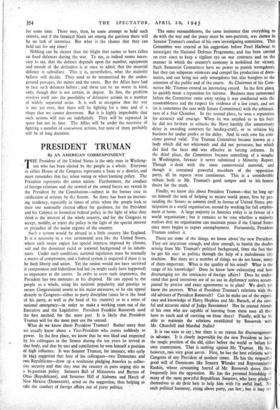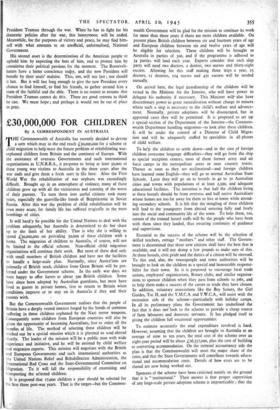PRESIDENT TRUMAN
By AN AMERICAN CORRESPONDENT Such a system would be absurd in a little country like England. It is a necessity in a vast continental area like the United States, where each major region has special interests imposed by climate, soil and the dominant racial or national background of its inhabi- tants. Under such conditions national legislation must be normally a matter of compromise, and a federal system is required if there is to be both liberty and union. Yet the nation would not have survived if compromise and federalism had led (as might easily have happened) to impotence at the centre. In order to avert such impotence, the President has two measures at his disposal. He can appeal to the people as a whole, using his national popularity and prestige to secure Congressional assent to his major measures, or he can appeal directly to Congress—either to party discipline (since he is the head of his party, as well as the head of .his country) or to a sense of national emergency—in order to make a working team out of the Executive and the Legislative. President Franklin Roosevelt used the first method, for the most part. It is likely that President Truman will for the most part use the second.
What do we know about President Truman? Rather more than we usually know about a Vice-President who comes suddenly to power. In- the first place, we know that he was liked and 'respected by his colleagues in the Senate during the ten years he served in that body, and that by tact and conciliation he won himself a position of high influence. It was Senator Truman, for instance; who early in 1943 suggested that four of his colleagues—two -Democrats and two Repdblicans—draw up a resolution pledging America to collec- tive security and that they tour the country in pairs urging this as a bi-partisan policy. Senators Ball of Minnesota and Burton of Ohio (Reptiblicans), and Senators Hill of Alabama and Hatch of New Mexico (Democrats), acted on the suggestion, thus helping tO take the conduct of foreign affairs out of party politics. •
The same reasonableness, the same insistence that everything to do with the war and the peace must Abe non-partisan, was shown in Senator Truman's conduct of his own investigating committee. This Otinunittee was created at his suggestion before Pearl Harbour to investigate the National Defence Programme, and has been carried on ever since to keep a vigilant eye on war contracts and on the manner in which the country's economy is mobilised for victory. Such Senatorial Committees have no power to punish wrongdoers, but they can subpoena witnesses and compel the production of docu- ments, and can bring not only wrongdoer's but also bunglers to the attention of the public, and of the courts. As Chairman of his Com- mittee Mr. Truman created an interesting record. In the first placq he quickly made a reputation for fairness. Business men summoned before the Committee came away saying it was conducted with the reasonableness and the respect for evidence of a law court, and not (as is sometimes the case with Senate Committees) with the arbitrari- ness of a Star Chamber. In the second place, he won a reputation for accuracy and courage. When he was satisfied as to his facts he did not hesitate to criticise the Navy ,harshly (for unnecessary . delay in awarding contracts for landing-craft), or to criticise big business for undue profits or for delay. And in each case his criti- cisms proved valid. Tne Truman Committee became known as a body which did not whitewall' and did not persecute, but which did find the facts arid was . effective in forcing reforms. In the third place, the Committee became something of a wonder in Washington, because it never submitted a Minority Report. Though it dealt with the most controversial material,- and though it contained powerful members of the opposition party, all its reports were unanimous. This is a considerable tribute both to Mr. Truman's good temper and to his honest desire for the truth.
Finally, we know this about President Truman—that he long • ago set himself the task of helping -to secure world peace, first by per- suading the Senate to commit itself in favour of United States par- ticipation in a world organisation, second by working for full employ- ment at home. A large majority in America today is in favour of a world organisation ; but it remains to be seen whether a majority realises that no organisation can maintain peace if the United- States once more begins to. export unemployment. Fortunately, -President Truman realises it. • These are some of the things we know about' the new President. They are important enough, and clear enough, to banish the doubts arising from Mr. Truman's political background; frem the fact that he got his start in politics through the help of 0 Malodorons' city machine. Bin there are a number of things we do not know, many of them important. -What is the- quality of his mind? What is the range of his- knowledge? Does he knoW hoW exhausting and how discomiging are the intricacies of foreign affairs? Does he under- stand that good intentions are of no use -in diplomacy unless accom- panied by precise and exact agreeinents as to plan? We don't yet know the answers. What of President Truman's relations -with the old'advisers of President Roosevelt? Can he make use Of the experi- ence and knowledge of Harry Hopkins and Mr. Baruch, of the Care-: ful and accurate mind of-judge Roseman? Has he trusted friends of his Own who are capable of learning from thete men all they have -to teach and of carrying on from there?' Finally, -wilt:-.he be able to maintain the relations established by 'Roosevelt with
Mr. Churchill and Marshal Stalin? '
It is too soon to say ;. bin there is no reason for discouragement in advance. It is elearlY impossible for the new President to have the magic position of the old, .either before the world or before his own countrymen, 'That is nothing against Mr. Truman. He has, hoWeyer,two very great ass-ts." First,he has the best relations with Congress of any President of modern times, He has the respectful good will, of Democrats like Senator Wheeler and itepresentative Rankin,. Whose consuming hatred of Mr. Roosevelt -drove Ahem frequently into the opposition. He has the personal friendship cf many of the- most powerful Republican Senators, who have pledged themselves to do their, best to help .him with his awful load. No such political harniony, rising above party, can last ; but it may see
President Truman through the war. When' he has to fight for his domestic policies after the war, this honeymoon will be ended. Meanwhile, for the purposes of victory and peace, he may find him- self with what amounts to an unofficial, unformalised, National Government.
His second asset is the determination of the American people to uphold him by expecting the best of him, and to protect him by containing their political passions for the moment. The Roosevelt- haters have a bitter conscience today, and the new President will benefit by their souls' malaise. This, too, will not last ; nor should it last. But it will last long enough to give the new President every chance to find himself, to find his friends, to gather around him a team of the faithful and the able. There is no reason to assume that President Truman cannot do this. There are good reasons to think he can. We must hope ; and perhaps it would not be out of place to pray.



























 Previous page
Previous page